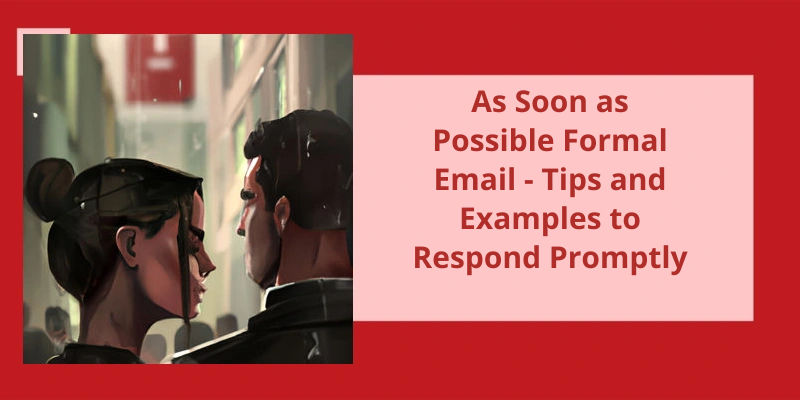In today's fast-paced world, time is of the essence. When it comes to professional communication, getting the message across in a timely manner can often be crucial. This is especially true when the matter at hand is urgent and requires immediate attention. In such scenarios, sending a formal email is often the norm. However, simply composing an email and hitting the send button may not be enough. It’s equally important to convey the urgency of the matter and express the need for a prompt response from the recipient. As such, using the right expressions and tone can make all the difference in ensuring that the email is taken seriously and acted upon as soon as possible. In this regard, phrases such as "As this matter is urgent, I’d appreciate a reply as soon as possible," "I’d be grateful for your prompt reply," or "I look forward to hearing from you as soon as possible" can be valuable tools in getting the attention of the recipient and conveying the importance of the matter at hand. So the use of the right expressions while writing a formal email is just as important as composing the body of the email itself.
How Do You Say Reply ASAP in a Polite Way?
When we need an urgent response from someone, it can be tempting to use a direct and forceful approach. However, it’s important to remember that politeness and courtesy can often be more effective in inspiring a speedy reply. One way to request a prompt response without being overly demanding is to express gratitude or appreciation for the persons time and attention. By acknowledging the value of their input, we show that we value their expertise and are willing to wait for their response.
Another approach is to emphasize the urgency of the matter at hand. This can be done by using phrases such as “as this matter is urgent” or “time is of the essence.”. By drawing attention to the importance of the issue, we’re more likely to motivate the recipient to respond quickly. However, it’s important to avoid exaggerating the urgency of the situation, as this can come across as manipulative or insincere.
In addition to highlighting the urgency of the message, it can be helpful to provide a clear and specific deadline for the response. For example, we might say “I’d appreciate a response by the end of the day” or “I need a reply before our meeting next week.”. By setting expectations upfront, we make it easier for the recipient to prioritize our message and respond promptly.
When requesting an urgent reply, it’s also important to show empathy and understanding for the recipients situation. We can do this by acknowledging that they may be busy or overwhelmed, and by expressing our willingness to work with them to find a mutually convenient time to discuss the issue. This approach can help to build rapport and trust with the recipient, which can in turn foster a more productive and collaborative working relationship.
Finally, it’s worth noting that tone and language are key when requesting a quick reply. By using polite and respectful language, we convey a sense of professionalism and courtesy that can help to build positive working relationships with colleagues and peers. On the other hand, an overly demanding or aggressive tone can be off-putting and may result in a delayed or incomplete response. When in doubt, err on the side of politeness and diplomacy, and remember that a little gratitude can go a long way.
Now that we’ve clarified that using “as soon as possible” is perfectly acceptable in professional settings, let’s explore some alternatives that can come into play depending on the context at hand.
Is It Polite to Say as Soon as Possible?
Using language that conveys a sense of urgency is often necessary in professional settings, where deadlines and time-sensitive projects are common. While the phrase as soon as possible may feel abrupt or pushy, it’s actually a polite way of communicating the need for prompt action. The use of the word please helps soften the language, indicating that the request is made with respect and consideration for the other persons time and priorities.
It’s important to remember that tone and context are key when it comes to communication. While as soon as possible may be appropriate in a professional email or text message, it’s use could be perceived as rude or abrupt in more casual settings or personal conversations. It’s always important to consider the context and recipient when choosing the most appropriate language.
Another alternative to asap is the phrase “at the earliest,” which communicates a similar sense of urgency while still maintaining a polite tone. This phrase indicates that the deadline is important but also allows for flexibility, suggesting that the task should be completed as soon as possible within the constraints of the recipients schedule and workload.
Ultimately, clear and concise communication is key in professional settings, and using phrases like as soon as possible or at the earliest can help ensure that deadlines are met and projects are completed efficiently. By maintaining a polite tone and considering the context and recipient, it’s possible to communicate urgency without being rude or abrupt.
In fact, in some cases, failing to use language that conveys urgency can actually be seen as disrespectful or unprofessional. If deadlines aren’t communicated clearly, it can lead to misunderstandings, missed opportunities, and a lack of respect for others time and priorities. By using language that conveys urgency in a polite and respectful way, professionals can communicate their needs and priorities effectively while still maintaining positive relationships with colleagues and clients.
It’s important to know how to politely indicate that you’ll contact someone in the near future. While some people may simply say “I’ll be in touch,” there are other ways to express this sentiment that may be more appropriate in different situations. Here are some common phrases that you can use to communicate your intention to contact someone soon.
How Do You Say That I Will Contact You Soon?
When youre expecting to connect with someone in the near future, you might be wondering what the best way to express this is. Saying “I’ll be in touch soon” is a phrase that conveys that you plan on reaching out at some point shortly, but isnt overly specific. This is a polite nod to acknowledging that a conversation will be happening, without being too pushy.
If youre in a professional setting such as a job interview or business meeting, you may prefer to be more formal in your language. In this case, saying “I look forward to contacting you soon” is a phrase that conveys professionalism and respect for your business associate or interviewer. This phrase demonstrates that you value their time and are excited to connect with them in the future.
It’s important to remember that the tone of your message conveys a lot about your intentions. Using phrases such as “I look forward to connecting with you soon” creates a positive vibe and sets the tone for a productive exchange. On the contrary, using forceful or demanding language can potentially leave a sour impression on the person you’re trying to reach out to.
Whether youre trying to touch base with a friend, colleague or potential employer, taking a polite and professional approach in your language communicates your intentions clearly. It’s important to be considerate of the persons time and schedule and this can be reinforced by a simple, courteous statement such as “I’ll be in touch soon” or “I look forward to contacting you soon”.
Choosing the right words and tone for expressing an intent to connect with someone soon can make all the difference in establishing and maintaining professional and personal relationships. With a little attention to phrasing, you can create a respectful and positive environment that leads to productive conversations, opening up opportunities for collaboration and understanding. Remember to always be considerate and clear in your language and approach to pave the way for successful connections.
As we delve into the topic of language usage, it’s important to note the use of informal and formal language in different settings. One well-known example of this is the use of acronyms and abbreviations, such as “ASAP,” which may be deemed too informal in certain contexts. In this article, we’ll explore some common language transitions for both informal and formal contexts.
Is ASAP Formal or Informal?
ASAP, an acronym for “as soon as possible,” is mostly used in written or spoken informal communication. It’s commonly used in everyday conversation, especially in situations where an urgency in response is required. For instance, when trying to set up a casual meeting with a friend, you can use ASAP to convey the need for an immediate response.
However, in a professional setting, using ASAP might not be the best option. It may come across as too casual, and might even seem unprofessional or rude. In this context, it’s always better to use more formal phrases like “at your earliest convenience” or “as soon as possible, please.”
When transitioning from informal to formal communication, it’s essential to pay close attention to the words you use. Transitions can significantly impact the message youre trying to convey. Take, for example, “in the meantime” and “in the interim.”. In informal communication, both phrases are acceptable and mean the same thing. However, in formal communication, “in the interim” is the more appropriate phrase as it sounds more formal and professional in it’s tone.
Another transition that might come up in informal and formal communication is the use of “I think.”. In informal communication, “I think” is a perfectly acceptable phrase to use when expressing your opinion. However, in formal communication, it’s advisable to use more indirect phrases like “in my opinion” or “from my perspective.”. This emphasizes your credibility as a professional and shows that you aren’t merely expressing a personal opinion but rather an informed one.
However, in formal communication settings, ASAP may be viewed as too casual, and thus it’s unprofessional. It’s always best to use more formal phrases in professional settings.
Effective communication is a crucial aspect of building strong relationships in both personal and professional settings. When you need something done urgently, it can be difficult to express your urgency without seeming pushy or aggressive. Fortunately, there are ways to request expedited action without causing offense. One great alternative to saying “as soon as possible” is to use the phrase “when you’ve a chance,” followed by a specific timeline. This helps convey the importance of the request while still allowing the other person to prioritize their tasks accordingly.
What’s Another Way to Say as Soon as Possible?
In many professional settings, it’s often necessary to convey a sense of urgency without coming across as pushy or demanding. One common phrase used to communicate this urgency is “as soon as possible.”. However, this phrase can sometimes be perceived as overly forceful or abrupt, depending on the context and tone of the conversation. When a more polite or nuanced approach is desired, there are several alternative phrases that can be used to convey a similar sense of urgency.
One alternative is to say “when you’ve a chance.”. This phrasing is less immediate than “as soon as possible,” but still communicates that the task at hand is a priority. Additionally, it allows the recipient to determine their own timeline for completing the task, which may be advantageous in certain circumstances. For example, if the recipient is juggling multiple projects and doesn’t have the capacity to complete the task right away, they may appreciate the flexibility provided by this phrasing.
Another possible alternative to “as soon as possible” is to provide a specific timeframe for completion. For example, you might say “before tomorrow” or “by the end of the week” to communicate the urgency of the task without using language that may be interpreted as pushy. This approach can be particularly helpful when the task at hand is time-sensitive or requires a quick turnaround.
In addition to using more specific timeframes or offering flexibility with “when you’ve a chance,” it can also be helpful to acknowledge the other persons workload or competing priorities. This might involve saying something like “I understand that you’ve a lot on your plate right now, but if you could get to this as soon as youre able, that would be great.”. By showing empathy and understanding for the other persons situation, you can help build rapport and strengthen your working relationship.
When trying to communicate urgency without coming across as demanding, it’s also important to pay attention to tone and body language. Even if youre using more polite or nuanced language, your delivery can still convey a sense of urgency or stress. By speaking in a calm, measured tone and maintaining an open, approachable posture, you can help create a positive and productive environment for the conversation.
Whether you choose to offer flexibility, provide specific timelines, acknowledge competing priorities, or use a combination of these approaches, the key is to find a communication style that’s both effective and respectful of the other persons needs and preferences. With practice and attention to tone and delivery, it’s possible to convey a sense of urgency while still maintaining positive working relationships and professional decorum.
Source: What’s another word for “as soon as possible”?..
Conclusion
In conclusion, when it comes to sending a formal email and urgency is at play, it’s important to use appropriate language that conveys the importance of the matter. However, it’s important to avoid overusing these phrases and sounding pushy or demanding. A well-crafted email that balances urgency, professionalism, and politeness is the key to getting a timely response from the recipient. Remember, expressing urgency doesn’t necessarily mean compromising on etiquette. With the right tone and language, one can effectively communicate the importance of the matter while maintaining a respectful and polite demeanor.






